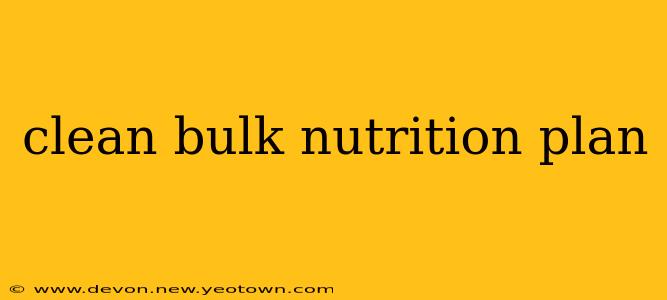The quest for muscle growth often leads down a path of questionable dietary choices. Many fall into the trap of believing that "bulking" necessitates consuming anything and everything in sight. But what if I told you that you could build serious muscle while maintaining a healthy, balanced diet? This is the essence of a clean bulk—a strategy focusing on nourishing your body with whole, unprocessed foods to maximize muscle growth while minimizing unhealthy fat gain.
Let's embark on a journey to discover the secrets of a successful clean bulk nutrition plan. Forget the processed junk; we're focusing on quality over quantity.
What is a Clean Bulk?
A clean bulk differs significantly from a "dirty bulk." A dirty bulk emphasizes rapid calorie surplus, often involving excessive consumption of processed foods, sugary drinks, and unhealthy fats. While this might lead to rapid weight gain, a significant portion will be fat, hindering muscle definition and overall health. In contrast, a clean bulk prioritizes whole, nutrient-dense foods to fuel muscle growth while minimizing fat storage. This approach takes a little longer, but the results are far more sustainable and aesthetically pleasing.
How Many Calories Should I Eat for a Clean Bulk?
This is a crucial question, and the answer isn't one-size-fits-all. Your calorie needs depend on several factors including:
- Your current weight: Heavier individuals generally require more calories.
- Your activity level: Those with higher activity levels need more energy.
- Your metabolism: Metabolism varies from person to person.
A general guideline is to increase your daily calorie intake by 250-500 calories above your maintenance level. You can determine your maintenance level using online calculators or consulting a nutritionist. Remember to track your progress—weigh yourself regularly and adjust your calorie intake accordingly. If you're not gaining weight, you might need to increase your calories. If you're gaining too much fat, reduce them slightly.
What Foods Should I Include in My Clean Bulk Diet?
Your clean bulk diet should prioritize lean protein sources, complex carbohydrates, and healthy fats. Here's a breakdown:
Lean Protein Sources:
- Chicken breast: A classic for a reason—high in protein, low in fat.
- Turkey breast: Similar benefits to chicken, with a slightly different flavor profile.
- Fish (salmon, tuna, cod): Excellent sources of protein and omega-3 fatty acids.
- Lean beef: Choose cuts with lower fat content.
- Eggs: A complete protein source, packed with essential nutrients.
- Greek yogurt: High in protein and calcium.
- Legumes (beans, lentils): Great plant-based protein sources.
- Tofu and Tempeh: Excellent vegetarian and vegan protein options.
Complex Carbohydrates:
- Brown rice: Provides sustained energy release.
- Quinoa: A complete protein and carbohydrate source.
- Oats: High in fiber and slow-digesting carbohydrates.
- Sweet potatoes: Rich in vitamins and minerals.
- Whole-wheat bread: Choose whole grain options over refined white bread.
- Fruits and Vegetables: Essential for micronutrients and fiber.
Healthy Fats:
- Avocados: Packed with healthy monounsaturated fats.
- Nuts and seeds: Excellent sources of healthy fats, protein, and fiber.
- Olive oil: Use for cooking and dressing salads.
What are the Best Protein Supplements for a Clean Bulk?
While whole foods should form the foundation of your diet, protein supplements can help you meet your daily protein requirements, especially if you struggle to consume enough protein through food alone. Whey protein, casein protein, and plant-based protein powders are popular choices. However, remember that supplements are supplementary—they should not replace whole foods.
How Much Protein Do I Need for Muscle Growth?
Aim for 1.6-2.2 grams of protein per kilogram of body weight (0.73-1 gram per pound). This will help support muscle protein synthesis and optimize muscle growth.
What About Supplements Besides Protein?
Creatine is a widely researched and effective supplement that can enhance strength and power output. It's also generally safe when used as directed. Consult your physician before starting any supplement regimen.
How Can I Track My Progress on a Clean Bulk?
Regularly track your weight, body measurements, and strength gains. Take progress photos to visually monitor your changes. Remember that muscle growth takes time and consistency.
What are the Potential Downsides of a Clean Bulk?
While generally safer than a dirty bulk, a clean bulk can still lead to some challenges:
- Increased hunger: A calorie surplus will naturally increase hunger. Focus on nutrient-dense foods to keep you feeling full.
- Digestive issues: Consuming more food can sometimes lead to digestive discomfort. Pay attention to your body and adjust your diet as needed.
- Potential for fat gain: Although minimized compared to a dirty bulk, some fat gain is still possible if you consume too many calories. Monitor your progress carefully.
Embarking on a clean bulk is a commitment to both muscle growth and overall health. By prioritizing whole foods, tracking your progress, and making informed decisions about your diet and supplementation, you can achieve your physique goals while feeling your best. Remember, consistency is key. Good luck!

